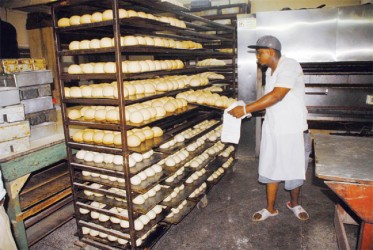Like so many other bakeries in Guyana, Nedd’s Sons & Daughters Bakery, situated at Garnett & Campbell streets in Campbellville has a rich history.
Half a century of operation has seen two generations of Nedds take their turns at the helm of the business. There is an air of permanence about the establishment; its growth over the years having taken it from a community facility to an expanded coastal service. In the Guyana tradition, there is an element of longevity, even permanence to Nedd’s Bakery. The three brothers who now run the establishment do not create the slightest impression of going anywhere else soon.
The Nedds have come through the wars of the bakery sector, from the unrelenting competition that has always characterized it, to the rollercoaster ride arising out of the trauma of a country that drove the wheat flour business underground by banning its legal importation for a considerable period. None of the various experiments that have been applied in an effort to try to replace wheat flour have quite worked. The problems have been twofold, taste and technology. On the one hand political advocacy of local replacements for imported wheat have simply failed to sway Guyanese. On the other, we have failed to offer persuasive evidence that we possess the technology to meet the qualitative or quantitative requirements necessary for replacing wheat flour in a sustainable way.

Even now, the Nedd brothers say, the flour saga is far from over. The National Milling Company (Namilco) continues to protest competition from a host of illegal quarters. Sources in the sector say that flour is smuggled into Guyana from as far away as Turkey and sold from clandestine distribution centres across the country. When this newspaper spoke with Namilco two weeks ago the company disclosed that it had just unearthed an illegal operation that involved the distribution of ‘rogue’ flour in Namilco bags.
The Nedds have had other painful experiences with flour. The brothers recall a costly lesson they learnt from being duped into buying a batch of what they were told was “cheap whole wheat flour” and eventually having to throw away more than 250 pounds of the commodity. And they are not altogether indifferent to Agriculture Minister Dr Leslie Ramsammy’s recent recommendation that bakers consider mixes of wheaten flour with other less popular types (rice, breadfruit and cassava), but concede that they have a healthy measure of caution. The industry and the country, they believe, have already learnt costly lessons from tampering with people’s tastes.
After the passing of the bakery’s founder, Cecil Patrick Nedd in 1983, his wife Parbattie assumed control. Setting the family’s loss aside, the founder’s death was particularly untimely. It occurred at a time when the socio-political fallout from the import prohibition on flour was at its height and even the Nedd brothers concede that their mother’s tenure at the head of the business was by no means a period of distinction, For a while, she lost control of the business, financial difficulties having forced her to agree to rental to another business. In 1990 she managed to reinstate the family and the name to the establishment. Her retirement two years ago following a period of illness left her sons in charge.
The restoration of flour to the list of allowable imports and major investments in modernisation have placed the industry on a firmer footing. The driving force behind production at Nedd’s Bakery is its Canadian-manufactured revolving tray oven with a capacity of 56 18”x26”x1” bun pans and which, the manufacturers say, is “capable of baking any type of bread, buns, bagels, pizza, pastries and other foods.” The family is currently contemplating investing in a second similar oven.
A busy staff of about 10 employees and an assortment of professional paraphernalia that includes large electric mixing bowls lend the 40ft x 30ft work space a businesslike appearance. The ever present possibility of rising flour prices apart, the Nedd brothers say that high energy costs is the bane of their existence. A monthly electricity bill in excess of $150,000 is the heaviest of their overheads and continues to eat into their takings.
There are also challenges associated with striking a balance between keeping prices down and ensuring workable profit margins. The Nedd brothers must strategise regarding the timing for passing on to customers at least a part of the cost associated with periodic rises in the price of flour. While they are aware of the considerable loyalty of their customers, it is not a loyalty that they take for granted. Poorly thought out price increases can chase customers away.
Flour purchases of around 50 bags per week ensure that there is a cushion once around 30 bags are used every week. The Nedds say the concerns over the likelihood of spoilage preclude them from holding a larger stock.
The Nedds may consider themselves experienced bakers but they refuse to take anything for granted. They continue to adhere to the same recipes and the same routines having learnt from costly experiences that ill-conceived changes can have costly consequences; not least in the baking sector.





